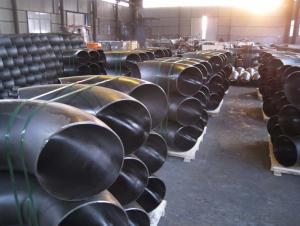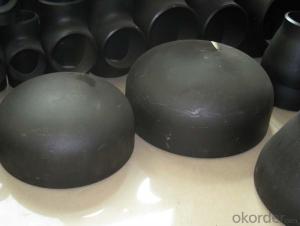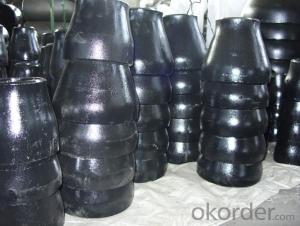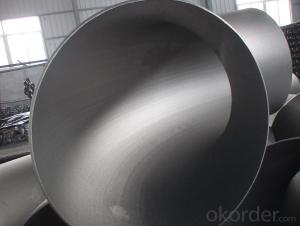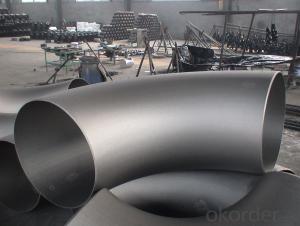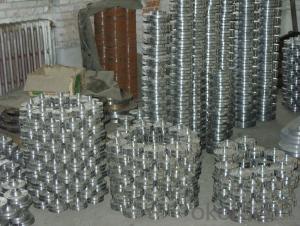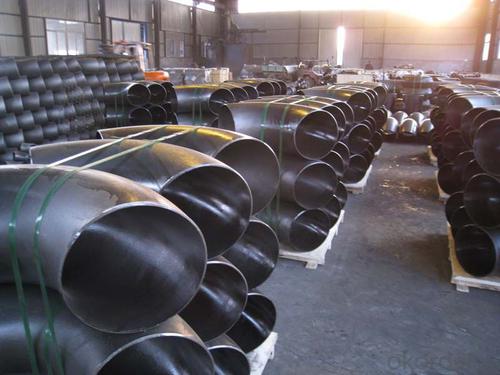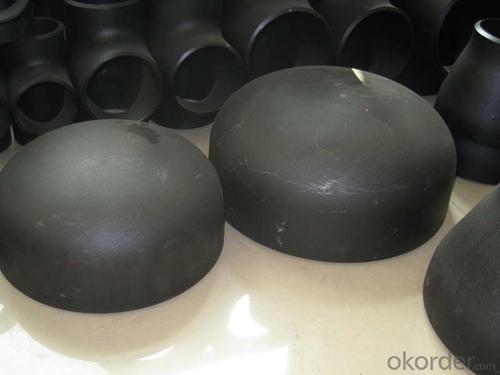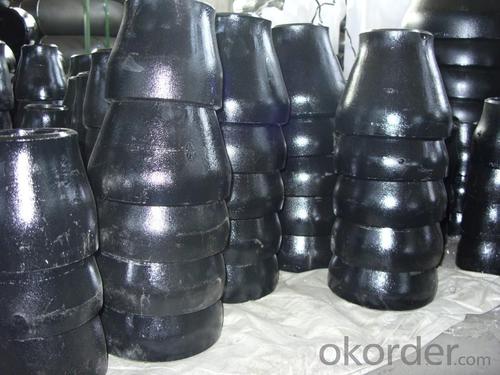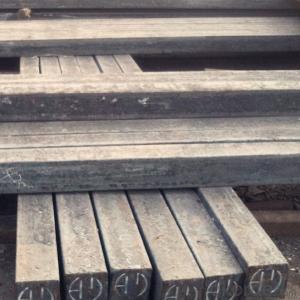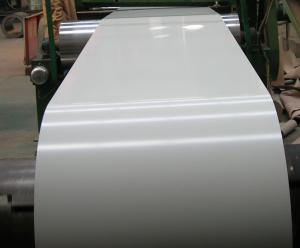Carbon Steel Pipe Fittings SA105 BEND 90DEG
- Loading Port:
- China Main Port
- Payment Terms:
- TT OR LC
- Min Order Qty:
- -
- Supply Capability:
- -
OKorder Service Pledge
OKorder Financial Service
You Might Also Like
Specifications
pipe fitting elbow
Certificate:ISO:9001-2000
New material,completely meet asme and din standard
Best price
1. type: AISI ASTM A234 WPB BW Con Elbow
2. Size: 1/2"-48"(1/2"-24"is seamless and 26"-48"is welded)
3. Wall thickness: sch10-160, STD, XS, XXS
4. Material: A234WPB, A420WPL6, A420WP5, WP11, WP12, WP22, etc
5. Welding line: seamless
6. Angle of bend: 30, 45, 90, 180degree
7. Bending radius: SR, LR
8. Standard: ANSI B16.9, JIS, SB, DIN, GB
9. Surface treatment: black paint, vanis paint, black rust-proof oil,
transparent oil, hot galvanizing
10. Application: petroleum, electricity, chemical, natural gas, metallurgy,construction,
shipbuilding and other fields because of its high pressure, high temperature, etc
11. connection: welding
12. technics:forged
13.Certificate:ISO9001 - 2000, CE, SGS, etc.
14. packaging: wooden case, pallet, container or in accordance with the
requirement of customers
15. Principle: quality fist, customer first, credit first
16. payment: L/C T/T
17. delivery time: 7-25 days after payments
18. Notes: the bevel can be made in accordance with the special requirements
of the customers
19. Others: we can also produce the products according to the requirements
of the customers
The main production:
1. PIPE FITTINGS: elbows, tees, bends, reducers, cap, flanges and sockets etc.
2. PIPE: bult welded pipes, seamless pipes, threaded pipes, etc.
We sincerely welcom customers at home and abroad to visit us and seek common development.
- Q: How is steel used in the production of amusement park rides?
- Steel is used in the production of amusement park rides due to its strength, durability, and ability to withstand heavy loads and forces. It is commonly used to construct the framework, supports, and tracks of roller coasters and other thrill rides, ensuring the safety and stability of the ride while providing a smooth and thrilling experience for riders.
- Q: How are steel forgings used in heavy machinery and equipment?
- Steel forgings are used in heavy machinery and equipment to provide superior strength, durability, and resistance to wear and tear. These components are commonly used in critical parts such as crankshafts, gears, axles, and connecting rods, ensuring reliable and efficient operation even under extreme conditions. The precision and flexibility offered by steel forgings allow manufacturers to create complex shapes that optimize performance and meet specific engineering requirements, making them indispensable in the heavy machinery industry.
- Q: How are steel beams used in construction?
- Steel beams are commonly used in construction to provide structural support and stability to buildings and infrastructure. They are often used as load-bearing elements in the construction of walls, floors, and roofs, and they can also be used as columns or braces. Steel beams are preferred due to their high strength, durability, and versatility, allowing for the construction of larger, more complex structures.
- Q: What are the different types of steel products used in the manufacturing of pet accessories?
- There are various types of steel products used in the manufacturing of pet accessories such as stainless steel bowls, metal crates and cages, steel chains or leashes, steel grooming tools, and steel tags or identification collars.
- Q: How are steel profiles used in the construction of high-rise towers?
- Steel profiles are commonly used in the construction of high-rise towers as structural elements. These profiles, such as I-beams and columns, provide strength, stability, and flexibility to the building's framework. They are used to create the skeleton of the tower, supporting the weight of the structure and distributing loads evenly. Additionally, steel profiles allow for efficient construction, as they can be prefabricated off-site and easily assembled on-site. Overall, steel profiles play a crucial role in ensuring the safety and durability of high-rise towers.
- Q: How is steel used in the manufacturing of material handling equipment?
- Steel is commonly used in the manufacturing of material handling equipment due to its strength, durability, and versatility. It is used to create the frames, supports, and components of various equipment such as forklifts, cranes, conveyors, and storage racks. Steel's high tensile strength allows these equipment to handle heavy loads and withstand the rigors of daily use in industrial environments. Additionally, steel can be easily shaped, welded, and machined, making it an ideal choice for creating complex and customized designs required in material handling equipment.
- Q: How is steel used in the manufacturing of elevator systems?
- Steel is used in the manufacturing of elevator systems primarily for its strength and durability. It is used to construct the frame, support beams, and shafts of the elevator, providing structural stability and ensuring the safe transportation of passengers or goods. Additionally, steel is used in the fabrication of elevator doors, car panels, and other components due to its excellent resistance to wear and tear.
- Q: How is steel used in the construction of sports facilities?
- Steel is commonly used in the construction of sports facilities due to its strength and durability. It is used to create the framework of the structures, such as the supports for roofs and walls. Steel is also used in the construction of bleachers, seating areas, and staircases. Its versatility allows for the creation of large, open spaces, ensuring the safety and comfort of spectators. Additionally, steel's resistance to corrosion makes it suitable for outdoor sports facilities, as it can withstand harsh weather conditions.
- Q: What are the advantages of using steel in the construction of airports?
- There are several advantages of using steel in the construction of airports. Firstly, steel is a highly durable and strong material, capable of withstanding heavy loads and extreme weather conditions. This makes steel structures resilient and long-lasting, ensuring the safety and longevity of airport buildings. Secondly, steel is a versatile material that allows for flexible and efficient designs. It can be easily fabricated and customized to meet the specific needs and requirements of airport structures, such as large open spaces, wide spans, and complex geometries. This flexibility in design allows for efficient construction processes and reduced construction time. Additionally, steel is a sustainable choice for airport construction. It is a recyclable material, meaning it can be reused or repurposed at the end of its life cycle, reducing the environmental impact. Moreover, steel structures can be prefabricated off-site, resulting in less waste and disruption during construction. Furthermore, steel offers cost advantages in many cases. Although the initial cost of steel construction may be higher compared to other materials, its durability, low maintenance requirements, and ease of modification in the future can result in significant long-term cost savings. Overall, the advantages of using steel in airport construction include its durability, versatility, sustainability, and cost-effectiveness, making it an ideal choice for creating safe, efficient, and visually appealing airport structures.
- Q: What are the different types of steel reinforcement used in construction?
- There are several types of steel reinforcement used in construction, including rebar (reinforcing bar), welded wire mesh, and steel fibers. Rebar is commonly used in concrete structures to provide tensile strength and prevent cracking. Welded wire mesh is a grid-like material made of steel wires welded together, which helps distribute stress evenly and provide structural support. Steel fibers, on the other hand, are small, discrete lengths of steel that are added to concrete to enhance its strength and durability. Each type of steel reinforcement has its own advantages and is used based on the specific requirements of the construction project.
Send your message to us
Carbon Steel Pipe Fittings SA105 BEND 90DEG
- Loading Port:
- China Main Port
- Payment Terms:
- TT OR LC
- Min Order Qty:
- -
- Supply Capability:
- -
OKorder Service Pledge
OKorder Financial Service
Similar products
Hot products
Hot Searches
Related keywords
